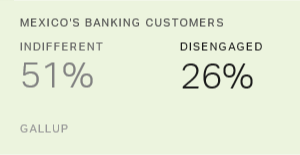GALLUP NEWS SERVICE
PRINCETON, NJ -- Maintaining worker productivity these days takes much more than breaking up groups at the water cooler or limiting smoke breaks. The evolution of the Internet as a major business tool has added an enormous potential for abuse in the workplace, evidenced by the number of workers losing their jobs for recreational Web surfing or writing personal e-mails at work. But just how much time are employees wasting on a daily basis? Gallup's annual Work and Education poll asked American workers directly to estimate the number of hours that they waste each work day, as well as the number of hours their typical co-worker wastes each day. On average, employees report they personally waste about one hour a day, while they believe their co-workers waste slightly more time -- about an hour and half -- each day.
The Aug. 13-16, 2007, poll first asked Americans who are employed full or part time to guess estimate the number of hours each work day that the typical employee at their workplace wastes or really does not do anything productive. Workers say that their co-workers waste an average of 1.44 hours each day. In all, 18% of employees say their co-workers do not waste any time at work, 13% say they waste less than an hour, 25% say one hour, 20% say two hours, and 12% say three hours or more each day. Eight percent of employees report that they work alone, and thus their responses do not enter into the mean calculation.
(Asked of adults who are employed full or part time) Next, we'd like you to think about the workers you work with at your place of employment. Just your best guess, about how many hours per work day does the typical employee at your workplace waste -- that is, really does not do anything productive?
|
2007 Aug 13-16 |
|
|
% |
|
|
None |
18 |
|
Less than one hour |
13 |
|
One hour |
25 |
|
Two hours |
20 |
|
Three hours |
6 |
|
Four hours or more |
6 |
|
|
|
|
DOES NOT APPLY/
|
8 |
|
No answer |
4 |
|
|
|
|
Mean |
1.44 hours |
|
Median |
1 hour |
The poll then asked workers to estimate the number of hours each work day that they, personally, waste or are not really productive. Workers say they are unproductive for an average of one hour each work day. Twenty-six percent of workers say they do not waste time at work, while 25% say they waste less than an hour, 29% one hour, 11% two hours, and 7% three hours or more.
(Asked of adults who are employed full or part time) And, trying to be as honest as you can, about how many hours per work day on average would you say that you, personally, waste -- that is, really don't do anything productive?
|
2007 Aug 13-16 |
|
|
% |
|
|
None |
26 |
|
Less than one hour |
25 |
|
One hour |
29 |
|
Two hours |
11 |
|
Three hours |
3 |
|
Four hours or more |
4 |
|
|
|
|
No answer |
2 |
|
|
|
|
Mean |
1.00 hour |
|
Median |
Less than 1 hour |
As noted in the tables, workers report personally wasting less time at work than their co-workers: 80% of workers say they personally wasted no more than an hour at work per day, while only 56% say this about the amount of time their typical co-worker wastes. Eighteen percent of workers say they are unproductive at least two hours a day; 32% say this about their fellow employees.
It seems reasonable that certain types of workers might waste more time on the job than other types of workers, but the results to the two questions are remarkably similar among different groups of employees. There are no significant differences between men and women, younger and older workers, higher income and lower income workers, employees in private companies and government workers, those who work less than 40 hours per week and those who work more hours, and employees who are "completely" satisfied with their jobs and those who are less satisfied or dissatisfied.
Survey Methods
Results are based on telephone interviews with 1,019 national adults, aged 18 and older, conducted Aug. 13-16, 2007. For results based on the total sample of national adults, one can say with 95% confidence that the maximum margin of sampling error is ±3 percentage points.
For results based on the sample of 547 adults employed full or part time, the maximum margin of sampling error is ±4 percentage points.
In addition to sampling error, question wording and practical difficulties in conducting surveys can introduce error or bias into the findings of public opinion polls.
